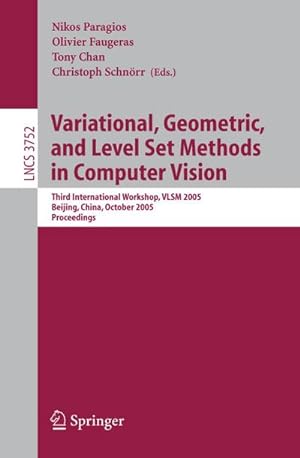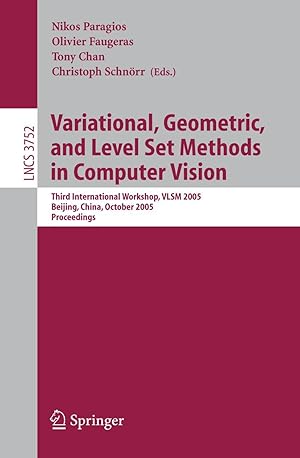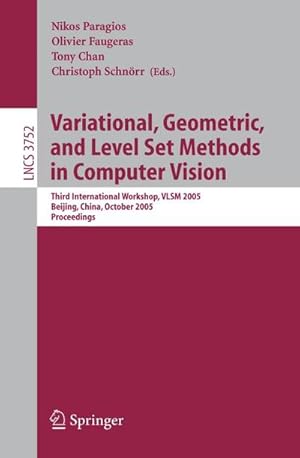variational geometric level set (8 risultati)
Filtri di ricerca
Tipo di articolo
- Tutti i tipi di prodotto
- Libri (8)
- Riviste e Giornali (Nessun altro risultato corrispondente a questo perfezionamento)
- Fumetti (Nessun altro risultato corrispondente a questo perfezionamento)
- Spartiti (Nessun altro risultato corrispondente a questo perfezionamento)
- Arte, Stampe e Poster (Nessun altro risultato corrispondente a questo perfezionamento)
- Fotografie (Nessun altro risultato corrispondente a questo perfezionamento)
- Mappe (Nessun altro risultato corrispondente a questo perfezionamento)
- Manoscritti e Collezionismo cartaceo (Nessun altro risultato corrispondente a questo perfezionamento)
Condizioni Maggiori informazioni
- Nuovo (8)
- Come nuovo, Ottimo o Quasi ottimo (Nessun altro risultato corrispondente a questo perfezionamento)
- Molto buono o Buono (Nessun altro risultato corrispondente a questo perfezionamento)
- Discreto o Mediocre (Nessun altro risultato corrispondente a questo perfezionamento)
- Come descritto (Nessun altro risultato corrispondente a questo perfezionamento)
Legatura
- Tutte
- Rilegato (Nessun altro risultato corrispondente a questo perfezionamento)
- Brossura (8)
Ulteriori caratteristiche
- Prima ed. (Nessun altro risultato corrispondente a questo perfezionamento)
- Copia autograf. (Nessun altro risultato corrispondente a questo perfezionamento)
- Sovracoperta (Nessun altro risultato corrispondente a questo perfezionamento)
- Con foto (4)
- Non Print on Demand (3)
Lingua (1)
Prezzo
- Qualsiasi prezzo
- Inferiore a EUR 20 (Nessun altro risultato corrispondente a questo perfezionamento)
- EUR 20 a EUR 45 (Nessun altro risultato corrispondente a questo perfezionamento)
- Superiore a EUR 45
Spedizione gratuita
- Spedizione gratuita in U.S.A. (Nessun altro risultato corrispondente a questo perfezionamento)
Paese del venditore
Valutazione venditore
-
Variational, Geometric, and Level Set Methods in Computer Vision: Third International Workshop, VLSM 2005, Beijing, China, October 16, 2005, Proceedings (Lecture Notes in Computer Science, 3752)
Da: Books Puddle, New York, NY, U.S.A.
EUR 78,66
Convertire valutaEUR 3,43 per la spedizione in U.S.A.Quantità: 4 disponibili
Aggiungi al carrelloCondizione: New. pp. xi + 367.
-
Variational, Geometric, And Level Set Methods in Computer Vision: Third International Workshop, Vlsm 2005, Beijing, China, October 16, 2005, Proceedings (Lecture Notes in Computer Science)
Editore: Springer Berlin Heidelberg, 2005
ISBN 10: 3540293485 ISBN 13: 9783540293484
Lingua: Inglese
Da: Revaluation Books, Exeter, Regno Unito
EUR 84,91
Convertire valutaEUR 28,77 per la spedizione da Regno Unito a U.S.A.Quantità: 1 disponibili
Aggiungi al carrelloPaperback. Condizione: Brand New. 2005 edition. 372 pages. 9.75x6.25x1.00 inches. In Stock.
-
Variational, Geometric, and Level Set Methods in Computer Vision : Third International Workshop, VLSM 2005, Beijing, China, October 16, 2005, Proceedings
Editore: Springer Berlin Heidelberg, 2005
ISBN 10: 3540293485 ISBN 13: 9783540293484
Lingua: Inglese
Da: AHA-BUCH GmbH, Einbeck, Germania
EUR 53,49
Convertire valutaEUR 62,91 per la spedizione da Germania a U.S.A.Quantità: 1 disponibili
Aggiungi al carrelloTaschenbuch. Condizione: Neu. Druck auf Anfrage Neuware - Printed after ordering - Mathematical methods has been a dominant research path in computational vision leading to a number of areas like ltering, segmentation, motion analysis and stereo reconstruction. Within such a branch visual perception tasks can either be addressed through the introduction of application-driven geometric ows or through the minimization of problem-driven cost functions where their lowest potential corresponds to image understanding. The 3rd IEEE Workshop on Variational, Geometric and Level Set Methods focused on these novel mathematical techniques and their applications to c- puter vision problems. To this end, from a substantial number of submissions, 30 high-quality papers were selected after a fully blind review process covering a large spectrum of computer-aided visual understanding of the environment. The papers are organized into four thematic areas: (i) Image Filtering and Reconstruction, (ii) Segmentation and Grouping, (iii) Registration and Motion Analysis and (iiii) 3D and Reconstruction. In the rst area solutions to image enhancement, inpainting and compression are presented, while more advanced applications like model-free and model-based segmentation are presented in the segmentation area. Registration of curves and images as well as multi-frame segmentation and tracking are part of the motion understanding track, while - troducing computationalprocessesinmanifolds,shapefromshading,calibration and stereo reconstruction are part of the 3D track. We hope that the material presented in the proceedings exceeds your exp- tations and will in uence your research directions in the future. We would like to acknowledge the support of the Imaging and Visualization Department of Siemens Corporate Research for sponsoring the Best Student Paper Award.
-
Variational, Geometric, and Level Set Methods in Computer Vision: Third International Workshop, VLSM 2005, Beijing, China, October 16, 2005, Proceedings (Lecture Notes in Computer Science, 3752)
Da: Majestic Books, Hounslow, Regno Unito
EUR 79,61
Convertire valutaEUR 7,48 per la spedizione da Regno Unito a U.S.A.Quantità: 4 disponibili
Aggiungi al carrelloCondizione: New. Print on Demand pp. xi + 367 Illus.
-
Variational, Geometric, and Level Set Methods in Computer Vision: Third International Workshop, VLSM 2005, Beijing, China, October 16, 2005, Proceedings (Lecture Notes in Computer Science, 3752)
Da: Biblios, Frankfurt am main, HESSE, Germania
EUR 81,65
Convertire valutaEUR 9,95 per la spedizione da Germania a U.S.A.Quantità: 4 disponibili
Aggiungi al carrelloCondizione: New. PRINT ON DEMAND pp. xi + 367.
-
Variational, Geometric, and Level Set Methods in Computer Vision
Editore: Springer Berlin Heidelberg, 2005
ISBN 10: 3540293485 ISBN 13: 9783540293484
Lingua: Inglese
Da: moluna, Greven, Germania
EUR 48,37
Convertire valutaEUR 48,99 per la spedizione da Germania a U.S.A.Quantità: Più di 20 disponibili
Aggiungi al carrelloCondizione: New. Dieser Artikel ist ein Print on Demand Artikel und wird nach Ihrer Bestellung fuer Sie gedruckt. Mathematical methods has been a dominant research path in computational vision leading to a number of areas like ?ltering, segmentation, motion analysis and stereo reconstruction. Within such a branch visual perception tasks can either be addressed through .
-
Variational, Geometric, and Level Set Methods in Computer Vision
Editore: Springer Berlin Heidelberg Okt 2005, 2005
ISBN 10: 3540293485 ISBN 13: 9783540293484
Lingua: Inglese
Da: BuchWeltWeit Ludwig Meier e.K., Bergisch Gladbach, Germania
EUR 80,24
Convertire valutaEUR 23,00 per la spedizione da Germania a U.S.A.Quantità: 2 disponibili
Aggiungi al carrelloTaschenbuch. Condizione: Neu. This item is printed on demand - it takes 3-4 days longer - Neuware -Mathematical methods has been a dominant research path in computational vision leading to a number of areas like ltering, segmentation, motion analysis and stereo reconstruction. Within such a branch visual perception tasks can either be addressed through the introduction of application-driven geometric ows or through the minimization of problem-driven cost functions where their lowest potential corresponds to image understanding. The 3rd IEEE Workshop on Variational, Geometric and Level Set Methods focused on these novel mathematical techniques and their applications to c- puter vision problems. To this end, from a substantial number of submissions, 30 high-quality papers were selected after a fully blind review process covering a large spectrum of computer-aided visual understanding of the environment. The papers are organized into four thematic areas: (i) Image Filtering and Reconstruction, (ii) Segmentation and Grouping, (iii) Registration and Motion Analysis and (iiii) 3D and Reconstruction. In the rst area solutions to image enhancement, inpainting and compression are presented, while more advanced applications like model-free and model-based segmentation are presented in the segmentation area. Registration of curves and images as well as multi-frame segmentation and tracking are part of the motion understanding track, while - troducing computationalprocessesinmanifolds,shapefromshading,calibration and stereo reconstruction are part of the 3D track. We hope that the material presented in the proceedings exceeds your exp- tations and will in uence your research directions in the future. We would like to acknowledge the support of the Imaging and Visualization Department of Siemens Corporate Research for sponsoring the Best Student Paper Award. 384 pp. Englisch.
-
Variational, Geometric, and Level Set Methods in Computer Vision
Editore: Springer Berlin Heidelberg, Springer Berlin Heidelberg Okt 2005, 2005
ISBN 10: 3540293485 ISBN 13: 9783540293484
Lingua: Inglese
Da: buchversandmimpf2000, Emtmannsberg, BAYE, Germania
EUR 53,49
Convertire valutaEUR 60,00 per la spedizione da Germania a U.S.A.Quantità: 1 disponibili
Aggiungi al carrelloTaschenbuch. Condizione: Neu. This item is printed on demand - Print on Demand Titel. Neuware -Mathematical methods has been a dominant research path in computational vision leading to a number of areas like ltering, segmentation, motion analysis and stereo reconstruction. Within such a branch visual perception tasks can either be addressed through the introduction of application-driven geometric ows or through the minimization of problem-driven cost functions where their lowest potential corresponds to image understanding. The 3rd IEEE Workshop on Variational, Geometric and Level Set Methods focused on these novel mathematical techniques and their applications to c- puter vision problems. To this end, from a substantial number of submissions, 30 high-quality papers were selected after a fully blind review process covering a large spectrum of computer-aided visual understanding of the environment. The papers are organized into four thematic areas: (i) Image Filtering and Reconstruction, (ii) Segmentation and Grouping, (iii) Registration and Motion Analysis and (iiii) 3D and Reconstruction. In the rst area solutions to image enhancement, inpainting and compression are presented, while more advanced applications like model-free and model-based segmentation are presented in the segmentation area. Registration of curves and images as well as multi-frame segmentation and tracking are part of the motion understanding track, while - troducing computationalprocessesinmanifolds,shapefromshading,calibration and stereo reconstruction are part of the 3D track. We hope that the material presented in the proceedings exceeds your exp- tations and will in uence your research directions in the future. We would like to acknowledge the support of the Imaging and Visualization Department of Siemens Corporate Research for sponsoring the Best Student Paper Award. 384 pp. Englisch.






